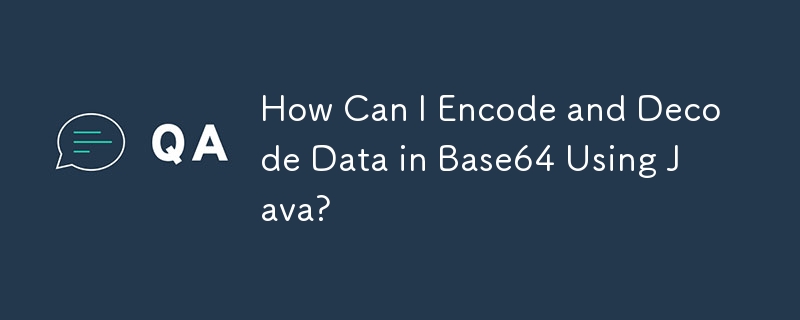

Encoding Data in Base64 in Java
When dealing with data that needs to be encoded in Base64, Java provides a straightforward mechanism through its comprehensive API. To accomplish this encoding, the Java API offers two distinct approaches: using legacy classes or utilizing the more modern java.util.Base64 class in Java 8 and later.
Legacy Approach: org.apache.commons or sun.misc
For compatibility with older versions of Java, you can opt for the sun.misc.BASE64Encoder class, albeit with some caveats. However, it's crucial to note that this class was deprecated in Java 9 and is thus discouraged for use in newer applications. As an alternative, you can leverage the Apache Commons Codec library by importing org.apache.commons.codec.binary.Base64 and employing the methods provided by the Base64 class.
Modern Approach: java.util.Base64 (Java 8 )
If you're working with Java 8 or later, the java.util.Base64 class offers a more advanced solution for Base64 encoding. With this class, you can access static methods for encoding and decoding, ensuring secure and convenient handling of data. The following code snippet illustrates its usage:
import java.util.Base64;
// Encode a byte array using the built-in Java 8 Base64 encoder
byte[] encodedBytes = Base64.getEncoder().encode("Test".getBytes());
String encodedString = new String(encodedBytes);
System.out.println("Encoded String: " + encodedString);
// Decode the encoded string back to its original form
byte[] decodedBytes = Base64.getDecoder().decode(encodedBytes);
String decodedString = new String(decodedBytes);
System.out.println("Decoded String: " + decodedString);Additional Considerations
It's noteworthy that the sun.misc.* packages should generally be avoided in favor of more current APIs. While they may still be available, they are deemed obsolete and are likely to be phased out in future Java versions. Therefore, adopting the java.util.Base64 class is the recommended approach for Base64 encoding in Java, ensuring code longevity and compatibility with evolving Java versions.
The above is the detailed content of How Can I Encode and Decode Data in Base64 Using Java?. For more information, please follow other related articles on the PHP Chinese website!
 What is Avalanche
What is Avalanche
 How to crack zip file encryption
How to crack zip file encryption
 bootmgr is missing and cannot boot
bootmgr is missing and cannot boot
 Database vulnerability repair methods
Database vulnerability repair methods
 How to use the notnull annotation
How to use the notnull annotation
 Why the computer keeps restarting automatically
Why the computer keeps restarting automatically
 How to watch live broadcast playback records on Douyin
How to watch live broadcast playback records on Douyin
 Which brand does OnePlus mobile phone belong to?
Which brand does OnePlus mobile phone belong to?




